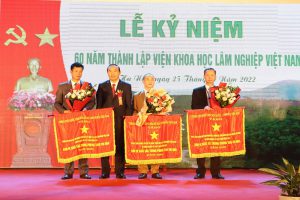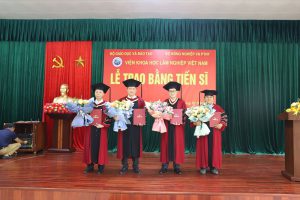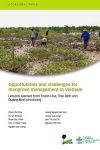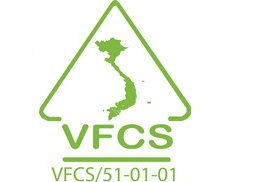1. RESEARCH ON COMPETITION INDICIES OF EVERGREEN BROAD LEAF, NATURAL FORESTS IN KON HA NUNG
Nguyen Thanh Son, Tran Van Con
Silvicultural Techniques Research DivisionForest Science Institute of Vietnam
Nguyen Danh
Deputy head of the NA deputies delegation of Gialai province
SUMMARY
Competition indices reflect the spatial growth constellation of individual trees within a stand and the interaction between them through spatial occupancy and resource exploitation. Competition indices may be position-dependent or position –independent depending on whether the distance to stand neighbors is used in the calculation or not. This paper has determined two groups of competition indices: (i) Position-independent indices include stand level density (stand basal area), relative tree size and TCI based on the basal area of larger trees; and (ii) Position-dependent indices include the social position after Dawkins (1958) and Competitive Influence Zone Overlap (CIO). Research results show that these indices may be used to estimate the growth reaction of individual trees based on simulation models as back ground for the silvicultural prescriptions on natural forest.
Keywords: Competition indices, Evergreen broad leaf natural forest, Growth reaction, Mortality.
2. RESEARCH ON NATURAL REGENERATION CHARACTERISTICS OF SCHIMA WALLICHII CHOISY IN REHABILITATION FORESTS IN LUC NGAN AND LUC NAM DISTRICTS, BAC GIANG PROVINCE
Vo Dai Hai
Forest Science Institute of Vietnam
SUMMARY
Schima wallichii Choisy is a native, large-sized, multi-purposes tree species with rather good seeding and coppicing for natural regeneration. The research was conducted, with Schima wallichii Choisy, in rehabilitated natural forests distributed in Luc Ngan and Luc Nam districts, Bac Giang province. Research results show that Schima wallichii Choisy has good regeneration ability under a forest canopy with a ‘species composition coefficient’ up to 5.3 in a forest status IIa and from 2.1 to 3.0 in a forest status IIb. The rate of promising regenerated trees on average is 56%;while the rate of medium and good regenerated trees is very high, 86-100%. Regenerated trees having a height under 1m occupy 48-53% of the sites. Trees distribution on the forest floor is equal.
Keywords: Schima wallichii Choisy, Natural regeneration, Rehabilitation forest, Bac Giang province
3. APPROPRIATE SIZE FOR PERQUADRATE AND ITS APPLICATION TO STUDY PLANT DIVERSITY OF THE NATURAL PINUS KESIYA FOREST IN LAM DONG AND SUB AREAS
Nguyen Duy Chinh
Faculty of Biology, University of DaLat
Huynh Kim Anh
Faculty of Natural Science, University of Phu Yen
SUMMARY
The paper preset a method of using superposed plots to indentify the most suitable area of perquadartes for studying plant diversity of the natural Pinus kesiya forests in Lam Dong and its subareas. The sizes of the superposed plots are 10x10m, 15x15m, 20x20m, 25x25m, 30x30m, 35x35m, 40x40m. The 35x35m perquadrates are suggested to be the most appropriate and most practical for research of plant diversity, especially for Pinus kesiya forest naturally grown in Lam Dong and the its subareas at the altitudes from 800m to 2000m a.s.l. The results have shown that the average Margalef index (DMarg) is 3,76. The species composition is rather rich and diverse, including 244 species, 179 genera, 68 families of four vascular plant phyla (Lycopodiophyta, Polypodiophyta, Pinophyta, and Magnoliophyta). There are eigth species which have been recorded in Red Data Book of Viet Nam. There are eight life forms, including: Megaphanerophytes (0,82%), Microphanerophytes (9,01%), Nanophanerophytes (18,44%), Chamaephytes (27,46%), Therophytes (27,05%), Lianophanerophytes (6,15%). Cryptophytes (6,56) and Epiphytes (4,51%).
Keywords: Superposed plots, Biodiversity, Margalef Index, Pinus kesiya forest, Lam Dong.
4. STUDYING THE INFLUENCE OF AUXIN AND GIBBERELLINE TO THE ROOTING ABILITY OF HOPEA ODORATA ROXB
Bui Trung
A Luoi High School, Thua Thien Hue pprovince
SUMMARY
The result of the influence of Auxin and Gibberelline to the rooting ability of Hopea odorata Roxb. in A Luoi (Thua Thien – Hue province) showed that NAA stimulates rooting ability while GA3 restrains it. The suitable concentration of NAA for rooting ability of Hopea odorata Roxb is 1000 ppm for five seconds. Using higher concentrations and longer soaking time increases the restrain of NAA and GA3 . The rooting ability of Hopea odorata Roxb twigs of one year old is better than two and three years old.
Keywords: A Luoi; Hopea odorata; Cuttings.
5. DETERMINATION OF THE MINIMUM DIAMETER LIMIT FOR CUTTING SOME COMMERCAL TREE SPECIES IN KON HA NUNG
Lai Thanh Hai
Forest Science Technology Application CenterForest Science Institute of Vietnam
SUMMARY
This paper presents research results on the species composition, the diameter growth, the number of species and diameter distribution as a scientific background to determine the minimum diameter limit for the main dominant timber species or species group with similar growing behavior (growing type). The results show that species like Dialium cochinchinense; Endospermum chinense; Lithocarpus sp; Michelia sp; and Gauruga pierreireach have a maximum diameter over 80 cm, while species like Symplocos sp; Xanthophyllum glaucum; Vitex canescens;and Wendlandia paniculata… rarely reach the diameter class over 50 cm, and species like Syzygium sp; Polyalthia cerasoides; Aglaia sp for most of the species the maximum increment occurs when the diameter is at least 50 to 60 cm, several species … often reach the diameter class from 50-66 cm; they are dominant tree species and always appearing in species composition of all forest status. Three species groups can be distinguished: group I: shade-tolerant species which height grows very slowly at first 10 years and speeds up later to reach the emergent canopy, such like Dialium cochinchinense; Schima superba; Calophyllum sp; Lithocarpus sp; Cupressus torulosa. (ii) Group II: semi-shade-tolerant species which height grows moderately at the first 10 years and reaches the upper story at mature stage, such like Cinnamomum sp; Endospermum chinense; Manglietia dandyi; Canarium sp; Madhuca sp; Aglaia sp; Michelia sp; Gauruga pierrei … (iii) Group III: Light-demanding species which height grows quickly at the juvenile phase and slow down later to reach the under story, such like Litsea glutinosa; Garcinia sp; Schefflera heptaphylla; Elaeocarpus sp; Neonauclea sp; Syzygium sp. Based on the research results, it has been recommended the minimum diameter limit of cutting for tree species group I is at 60 cm; group II at 55 cm and group III at 30 cm.
Keywords: Diameter growing behavior, Species composition, Number of species and diameter distribution, Minimum diameter limits.
6. RESEARCH ON RELATIONSHIPS BETWEEN DISTRIBUTION CHARACTERISTICS OF MANGROVE PLANTS AND PLANTS AND SOIL SALINITY, TIDAL TREQUENCY AT COASTAL AND RIVES OF CA MAU
Hoang Van Thoi
Forest Science Sub-Institute of South Vietnam
SUMMARY
The study was conducted in coastal and canals of Ca Mau province, aiming at identifying composition of plant species and determining influence of environmental factors to distribution of mangrove. Results will provide additonally basic knowledges to select suitable plant species for mangrove reforestation and sustainable management. It was recorded 33 species of 20 plant families during the study, in which true mangrove trees are 23 species, and 10 species are identified as associated species. Among these, Avincennia alba (AA) was occurred with the highest density, followed by Rhizophora apiculata(RA), the Kandelia cadel(KC) and Bruguiera parviflora (BP). The lowest density was observed in Sonneratia caseolalis (SC) and it was about 0.1 %. The average frequency of A. alba and R.apiculata species is 70.1% and 54.5%, respectively. While occurrence of R.mucronata, Ceriop tagal, S.alba, S.caseolaris, Phoenix padulosa and K.cadel varies from 1.3 to 3.9% only. Regarding adaptability to salinity and tidal conditions, Rhizophora apiculata is widely distributed, but most suitable condition of salinity is about 30-35 ‰ and tidal flooding frequency at high medium level. Ceriop decandra, on the other hands, presents suitably at 30 to -39 ‰ salinity with tidal flooding frequency from 3-6 days per month. Ceriop tagal is observed in 30-35 ‰ salinity condition and distributes in areas with medium to medium high flood. At salinity from 24.5 to 32.5 ‰ and a tidal flood prolongs from 5-13 days per month, Bruguiera sexangula is recorded. Distribution of Avincennia alba is concentratedly seen in a high range of salinity from 30 to 38.5 ‰ and all tide to high medium conditions. Distribution of A.officinalis, however, presents in as low salinity condition as 19.8 to 38‰ and submerged in 1-10 days per month of tide.
Keywords: Species, Mangrove, Salinity soil, Flood tide, Distribution
7. RESEARCH ON CHARACTERISTICS NATURAL REGENERATIVE OF CASTANOPSIS PIRIFORMIS HICKEL & A. CAMUS IN LAM DONG
Ngo Van Cam
Tropical Forest Research Centre – Forest Science Institute of Vietnam
Nguyen Toan Thang, Nguyen Ba Van
Silviculture Techniques Research Division – Forest Science Institute of Vietnam
Summary
Castanopsis piriformis Hickel & A. Camus is a native forest tree species with high ability of regeneration from seeds and sprouts. The research results showed that seedling density of C. piriformis in natural forest of Lam Dong is ranging from 167 to 2,417 stems/ha and mostly distributed on elevation under 1500m above sea level. Prospective seedlings accounted for under 34.5%. The number of species contributed for species composition structure was low, ranging between 4 and 8, and composition index of C. piriformis was ranging from 0.1 to 1.9. With elevation higher than 1500 m above sea level, C. piriformis disappeared in the species composition structure and there were no prospective seedlings. Height frequency distribution of naturally regenerated seedlings of C. piriformis was discontinuous. There was a high rate of seedlings in medium and good ranks, accounting for more than 60%. Regeneration of C. piriformis from seeds is better than from sprouting
Keywords: Natural regenation, Castanopsis piriformis Hickel & A. Camus, Lam Dong.
8. RESULT OF RESEARCH ON SELECTION SA NHAN TIM ORIGINS (AMOMUM LONGILIGULARE) FOR HIGH YIELD AND HIGH QUALITY TRAITS IN THE KBANG DISTRICT, GIA LAI PROVINCE, VIET NAM
Nguyen Danh
Deputy head of the NA deputies delegation of Gialai province
SUMMARY
Chinese amomum (Amomum longiligulare) grown under the shade of Melia azedarach forest (cover of 0.4 – 0.5) obtained high growth results. After 18 months of cultivation, four origins produced fruit and dry yields in the first year of 2.1 – 26.8 kg/ha. The Sa nhan tim tree which had its origins within the Binh Dinh province had the best yield of 26.8 kg/ha. The range of cover from the four origins varied from 57.3 – 91%, of which Sa nhan tim seeds from the Phu Yen and Khanh Hoa province had higher shade levels with a cover percentage of 78.2 – 91.0%. This more closed canopy cover would result in more limited soil erosion, soil leaching and nutrition. Four Sa nhan tim origins at the Son Lang commune, in the KBang district had flower and fruit set in the Summer – Autumn season (from May- August) and a similar possibility in the Autumn – Winter season (September – December).
Keywords: Selection, Origin, Sa nhan tim (Amomum longiligulare), KBang district, Gia Lai province.
9. RESEARCH ON DETERMING THE BENDING TECHNIQUE OF ACACIA HYBFID WOOD
Dang Dinh Boi
Nong Lam University, Ho Chi Minh city
Quach Van Thiem
Technical Education University, Ho Chi Minh city
Summary
The bended forming pressing of sawn timber has many advantages compared to the conventional processing the curved products such as: saving material, the bended components can resist higher loading forces, easy sanding and decoration. It is important to determine optimized technique parameters for minimizing the curvature recovery rate and the damage rate. This research determined the optimized technique parameters for the sawn timber subjected to bending at: the thickness 20mm, bending radius 800mm, 1000mm and 1400mm.
Keywords: Acacia hybrid wood, Curvature recovery rate after bending, Bending damage rate
10. RESEARCH ON THE EFFECTS OF CONCENTRATION, TEMPERATURE AND SOAK TIME OF POLYETYLENGLYCOL (PEG-600) ON THE STABILITY OF MODIFIED Manglietia conifera Dandy WOOD
Dao Xuan Thu
Tay Nguyen University
SUMMARY
The purpose of this study is to define the relation between parameters of concentration, temperature, soak time of PEG-600 and the stability of denatured Manglietia conifera Dandy wood. On the basis of that, we determined the optimal values of temperature, soak time and concentration of PEG-600 in order to produce denatured Manglietia conifera Dandy wood with high stability.
Keywords: Modified Wood, Manglietia conifera wood, PEG-600
Latest news
- Project: "Research on improving the economic efficiency of plantation timber value chains, meeting legal timber requirements and sustainable forest management"
- Project: Commercial-scale yield trial and completion of planting techniques for newly recognized acacia hybrid cultivars (BV586, BV376, BB055, BV584, BV523, BV434, BV350)
- Project: Study on technology of producing hollow veneer-based composite used in construction and interior wooden furniture
- VFCS is published on the website of the Forestry Department, Ministry of Agriculture, Forestry and Fisheries of Japan
- Memorandum of Understanding signing ceremony on handing over new wood material samples from the Finnish Embassy to the VAFS for displaying






